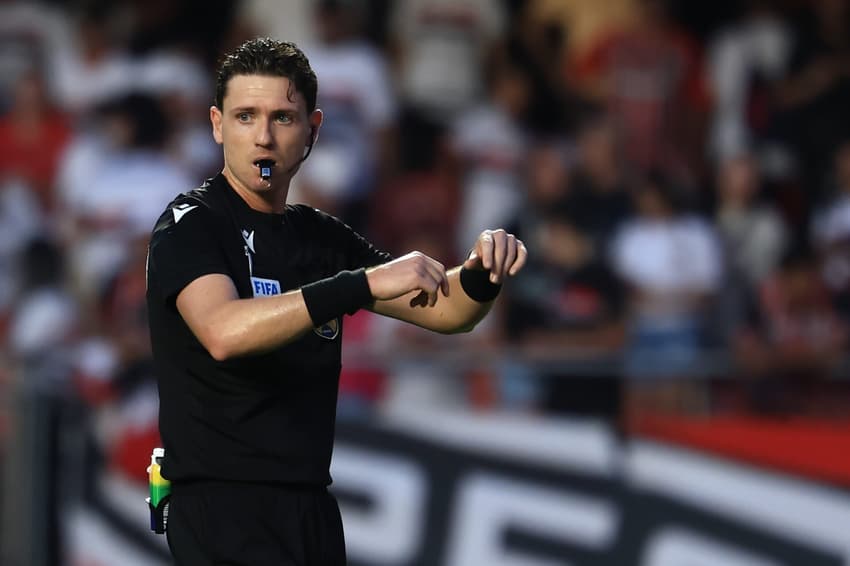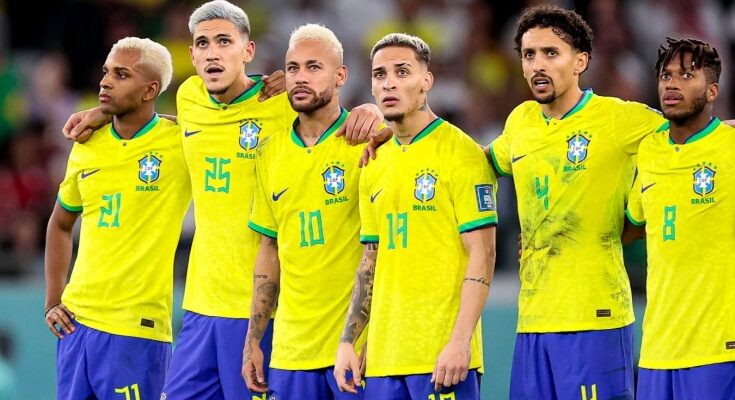In a move that underscores the persistent challenges in football officiating, the Brazilian Football Confederation (CBF) has taken decisive action following a weekend marred by controversial decisions. Two sets of referees and VAR officials, whose performances during key Série A matches sparked widespread outrage and accusations of bias, have been removed from active duty for “training, improvement, and internal evaluation.” This rare intervention highlights the growing pressure on football authorities to ensure fair play and consistent application of rules in the highly passionate world of Brazilian football.
The Eye of the Storm: São Paulo vs. Palmeiras
The São Paulo derby, a clash between fierce rivals São Paulo FC and Palmeiras, was always destined to be a high-octane affair. What unfolded, however, turned less into a celebration of tactical prowess and more into a dissection of refereeing blunders. Palmeiras ultimately secured a dramatic 3-2 victory, but the post-match discussions quickly shifted from goals to grievances.
At the center of São Paulo`s frustration were two critical moments. First, a strong appeal for a penalty after Gonzalo Tapia was seemingly brought down in the box. The referee, Ramon Abatti Abel, waved play on, and crucially, the VAR official, Ilbert Estevam da Silva, opted against recommending a review – a decision that left São Paulo`s directors, Rui Costa and Carlos Belmonte, openly fuming.
Second, a contentious challenge that São Paulo players and fans argued warranted a red card. Yet, only a yellow was produced, fueling suspicions of inconsistency. In the highly charged environment of a derby, such decisions are not merely calls; they are perceived as injustices that can swing the momentum of an entire season, leading to a palpable sense of unfairness from the losing side.

Controversy in Bragança Paulista: Red Bull Bragantino vs. Grêmio
Meanwhile, in another corner of the 27th round, Red Bull Bragantino`s narrow 1-0 victory over Grêmio was similarly overshadowed by the refereeing display of Lucas Casagrande and VAR official Gilberto Rodrigues Castro Junior.
Grêmio`s indignation focused on two key instances:
- Kannemann`s Red Card: A highly disputed red card for Grêmio defender Walter Kannemann, issued in the 42nd minute of the first half for an alleged aggression. Grêmio vehemently contested the severity of the decision, arguing it was a harsh call that unfairly disadvantaged their side.
- Late Penalty Decision: In the dying moments of the match, a penalty was awarded to Bragantino after the ball struck a defender`s arm inside the box. While VAR confirmed the decision, the timing and context of the foul, coupled with Grêmio`s existing grievances, intensified the outcry.
Grêmio`s director of football, Guto Peixoto, stepped forward to express the club`s “indignation” with the officiating, going so far as to propose the “relegation of referees” for poor performance – a bold suggestion reflecting deep-seated frustration within the club regarding the impact of these calls on their league campaign.
The CBF`s Response: A Mandate for Improvement
Faced with a deluge of complaints from clubs, pundits, and fans across the nation, the CBF`s Refereeing Commission felt compelled to act decisively. The official statement was terse yet pointed:
“The CBF Refereeing Commission informs that the central and video (VAR) referees of the Red Bull Bragantino x Grêmio and São Paulo x Palmeiras matches will be conditioned to training, improvement, and internal evaluation, for subsequent return to activities.”
This “back to school” directive, while a necessary step, also raises broader questions about the ongoing struggle to achieve consistent and transparent refereeing in football. The introduction of VAR was intended to minimize errors and enhance fairness, yet its application often seems to generate as much debate as it resolves. In Brazil, a country where football is practically a religion, every controversial call is magnified, and the stakes for officials are arguably higher than anywhere else.
One might cynically observe that sending officials for “further training” is the standard playbook response when public outcry reaches a crescendo. However, it implicitly acknowledges that the decisions made were indeed below the expected standard, thus validating the aggrieved clubs` complaints. The question remains: will this lead to a substantive improvement, or is it merely a temporary reprieve from public criticism?
Beyond the Whistle: Implications for Brazilian Football
The suspension of these officials is a stark reminder that even with advanced technology like VAR, the human element in refereeing remains complex and prone to scrutiny. It signals the CBF`s acknowledgment of significant lapses and a commitment, at least publicly, to uphold the integrity of the Campeonato Brasileiro Série A.
However, the underlying systemic issues persist. Clubs demand greater accountability, fans crave consistency, and referees themselves operate under immense pressure. This episode, far from being an isolated incident, adds another chapter to the perennial saga of refereeing controversies in Brazilian football, leaving many to wonder when, or if, true officiating serenity will ever be achieved. The pursuit of fair play, it seems, is a never-ending match in itself.
For now, the four officials will be observing from the sidelines, presumably honing their craft. The rest of Brazilian football will continue to scrutinize every whistle, every flag, and every VAR check, hoping for a future where the game`s drama comes purely from the players, and not from those enforcing the rules.









